FORMING RATIONAL BELIEFS & BELIEF SYSTEMS
By Shawn Malzahn
Beliefs are essentially the building blocks of our perceptions of reality, and therefore must be chosen wisely if we wish to live a life closer to what we might call “actual objective reality”, as opposed to the quasi-real fantasy land that we so often construct with our own imaginations, opinions, assumptions, and best guesses. Therefore, it will be our goal as we move through this lesson to be in a better position so as to be able to form those rational beliefs (and subsequent belief systems) with much more confidence and assurity that they will be rooted in sound logic, and therefore closer to Truth, as opposed to fallacy, as much as possible. We will do this by discussing four modes of discerning facts from mere opinion, namely; radical acceptance, radical denial, radical exposure and gradual exposure.
Hopefully by now we are better equipped with the knowledge and understanding of what beliefs are, why they are so important, and how they have come to be formed in our minds. Unless we have had some prior experience reading about these concepts, and/or have had some type of basic training in the past, it is very rare indeed that the average person will come to the realization that much of their present troubles today are unnecessarily caused, sustained, and compounded by habitual negative thoughts and beliefs inherited long, long ago. Yet even if one does arrive at this level of self-awareness, it is usually often late in the game of Life, and as such, becomes quite difficult to reverse due to all the negative momentum acquired over the years of psychological conditioning. Yet this DOES NOT mean that change is completely and utterly impossible, just harder, and it should be well known and properly understood that the harder a man or woman fights this worthy battle, the greater the glory of victory will be! For as they say, no pain, no gain.
So, what are we to do now? How should we proceed? And this is what we shall try to discuss in this lesson, how to form more rational beliefs and more realistic expectations about OURSELVES, about OTHERS, and about LIFE in general. Just because we have been motivated to dig up, examine, challenge, modify and/or replace our own personal unbeneficial thoughts, belief systems and value hierarchies, what guarantees do we have that we will not simply substitute one wrong view for another? One OPINION for another? Essentially making the same mistake all over again, and again, and again? This brings us to three very important questions pertaining to the proper process of accepting our beliefs and forming our various belief systems and value hierarchies, that is to say, the proper process of discerning facts from mere opinions to the highest degree of probability possible, I say probability, because we now know that our senses of perception, memory, and modes of communication are sometimes questionable and often unreliable sources of information gathering. Therefore, we need to employ a method that will help us determine what is real, what is right, and what is true to the greatest degree that our human faculties will allow. Hence the three questions, 1.) Do we belief everything? 2.) Do we believe nothing? And 3.) Do we rush to experience everything first hand despite the warnings and/or encouragements that other people give us?
Obviously, it would not be worthwhile and wise to believe absolutely everything that everyone ever tells us all the time, for if we did, we would surely be reducing ourselves from intelligent free-thinking human beings, to that of personal programmable bio-computers guided by the instructions of others. This method of discerning facts and accepting beliefs leaves us vulnerable to all sorts of manipulation, control, and confusion. Just imagine the extremely gullible, easily persuadable, simple-minded individual having to make sound decisions in order to deal with everyday common occurrences. Such a person walks into a mechanic shop and explains that his or her headlights are dimmer than normal, so the greedy shop owner sells them some new headlights along with a premium car battery so as to keep them brighter for longer. Such a person is told that they are the parent of a newborn child that really belongs to someone else, so they put all their life goals on hold in order to spend the next 18 years raising a child that isn’t even theirs. All in all, such a person with all FAITH and no REASON does not know their own backside from a hole in the ground, and will likely stay awake on Christmas night waiting for Santa Claus to come sliding down their chimney, thus this method of radically accepting beliefs will likely pump our characters full of conflict causing irrational beliefs and unrealistic expectations, which will then lead to undesirable consequences later on in life.
Yet to the opposite extreme, that of radical denial, we see the same problem in a new light. Life is nothing but lies and doubt for the highly skeptical person who refuses to believe absolutely any and everything that he or she is ever told or taught by other people. These are the people who will consistently miss out on the opportunities for advancement in life, because they failed to heed the advice of those who have experienced some small Truth for themselves firsthand. For example, such a person doubts their doctor when told that their present lifestyle they are living will lead to certain health complications in the long run, only to die several years later from the very same diseases and dysfunctions they were warned of by the doctor. Perhaps such a person doubts as to whether or not they have the ability to handle a job promotion they were recently offered at work, only to miss out on the opportunity due to their indecisive self-doubt. Such a person suffers from paralysis by analysis, a kind of mental stagnation that leads to indecisiveness brought on by the fatigue of trying to pick apart every single thing that he or she is ever told or taught by others, doubting, constantly questioning and never deciding on anything. Therefore, to believe absolutely nothing is just as unhealthy as believing absolutely everything, since all doubt and no faith leads to indecisive procrastination, as well as a sort of hopeless pessimism when we fail to convince ourselves that any truth can be known for certain.
Recognition of the inefficiency of these two methods of discerning facts, i.e., radical denial and radical acceptance, will likely lead us to the third method of radical exposure, or to quickly seek to place ourselves in some sort of situation and/or condition where we can experience the truth of something for ourselves first hand, without doubt, without faith, but driving by inpatient curiosity to know something for certain. As they say, curiosity killed the cat, just as the method of radical exposure will surely kill the ignorant adventurer who foolishly throws herself to the mysteries of unforeseen circumstances without proper preparation and planning beforehand. However, we may be inclined to believe that this method of discerning facts from fiction is best suited for bringing us as close as possible to the truth of something simply because it gives us a direct experience of that something wished to be known for certain. Yet not all experiences are worth having, not everything needs to be known firsthand, and some things are just better off left alone, or at least approached in a more intelligent manner. To illustrate the potential pitfalls of radical exposure, imagine a small child driven by impatient curiosity being told not to play with fire because they will get burned. The child really does not believe nor disbelieve the truth of this claim, but yet wishes to find out for themselves first hand, thus the child places their hand in an open flame only to get severely burned. Now the child knows the truth, but at what cost? PAIN. This is the philosophy of those who employ the method of radical exposure in order to form their beliefs. They say, I will not believe and I will not disbelieve until I have experienced it for myself, and I must experience it NOW so that I may rest assured that I know for certain! For to know is to grow, and I must grow as quickly as possible! Thus, I will force experiences upon myself despite the price of pain I must pay.
Let us take a brief moment now to clear up some potential misconceptions that may be forming in your mind. Just because we have made a clear distinction between the three modes of discernment, i.e., radical acceptance, radical denial, and radical exposure, does not mean to imply that there exist people who solely and only rely upon just one of these methods all the time. We would be hard-pressed to find someone who always believes everything all the time, just as we would have trouble finding someone who always disbelieves absolutely everything all the time, and it is rare indeed that someone will always seek to personally experience that which they whish to know without absolutely any faith nor doubt beforehand, that is to say, any preconceived notions whatsoever. The truth of the matter is the fact that most people actually use all three methods of discerning facts from fiction before making a final decision as to what they should believe, as well as what not to believe. However, the distinction I wish to make here is that certain people favor one method more so as opposed to others, and this imbalance is what causes unnecessary vulnerability to manipulation, confusion, inopportunity, hopelessness, conflict, and pain. The second misconception I wish to clear up if it should have happened to arisen in your mind, is the idea that pain is somehow bad, and able to be avoided completely depending on how we hose to form our beliefs. This is incorrect. Pain is inevitable and necessary in life. It is one of our greatest teachers of life lessons and should be listened to carefully instead of ignored. However, unnecessary and prolonged pain (which is suffering) is optional, it can be dramatically reduced, and/or avoided completely depending upon our perspectives, which depends on our beliefs, which obviously depends on the methods we employ to form those beliefs. Therefore, that is the goal of this lesson on discerning facts from fiction and coming to more rational conclusions, to avoid the extremes of radical acceptance, radical denial, and radical exposure by taking refuge in yet a fourth method of developing belief systems, a method that involves a healthy balance between the three previously mentioned methods, in other words, a nice blend of FAITH, DOUBT, and CURIOSITY, but with a twist. Let us call this fourth and final method of discernment, gradual exposure.
Gradual exposure is a process of coming to conclusions as to what is true, false, real, unreal, right, wrong, important, unimportant, etc., by patiently investigating and testing that which we are curious to know by taking into consideration the opinions, and supposed truths of others, with the understanding that there is likely some truth to that which we doubt, and likely something to doubt about that which we believe to be true. This open-minded approach helps to keep up the spirit of neutrality and honesty while weighing the facts, or essentially, the comparing and contrasting of that which we are investigating, with things that are already known to be true from our very own past personal direct experiences, experiences that are related and relevant to whatever it is that we are considering now. Only then can we safely proceed to test our initial judgments by gradually exposing ourselves to a situation and/or circumstance that will prove or disprove that which we are patiently, curiously, and honestly investigating. This method of gradual exposure helps to increase the probability of accurately discerning truth from falsehood, while at the same time, decreasing the risk of unnecessary exposure to prolonged pain and suffering caused by manipulation, confusion, inopportunity, hopelessness, and/or conflict with others.
In conclusion, forming our beliefs is very important because it shapes our perception of reality, which in turn, determines how we feel inside when things happen to us in the world, which is the motivating factor for our actions of speech and body that come with all the consequences that make up our present life experience. Thus, we need to be more mindful of how we are forming our beliefs and various belief systems, and we need to understand that our beliefs are only as good as the methods used to form those beliefs, or essentially, the ways in which we go about discerning facts from mere opinions. All in all, it is best to employ the method of gradual exposure which involves patiently, curiously and honestly investigating that which we wish to know for certain with sound logic, reason, and self-reflection.
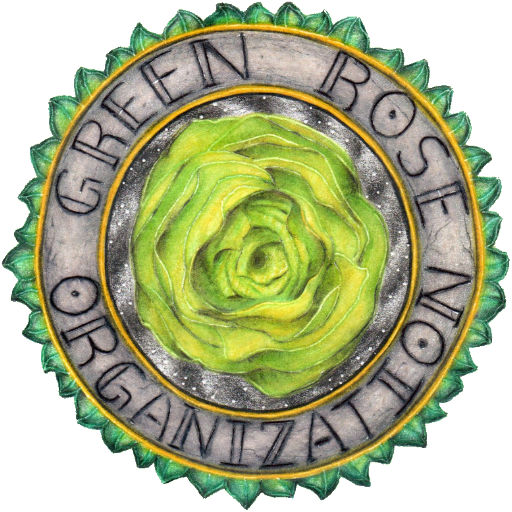
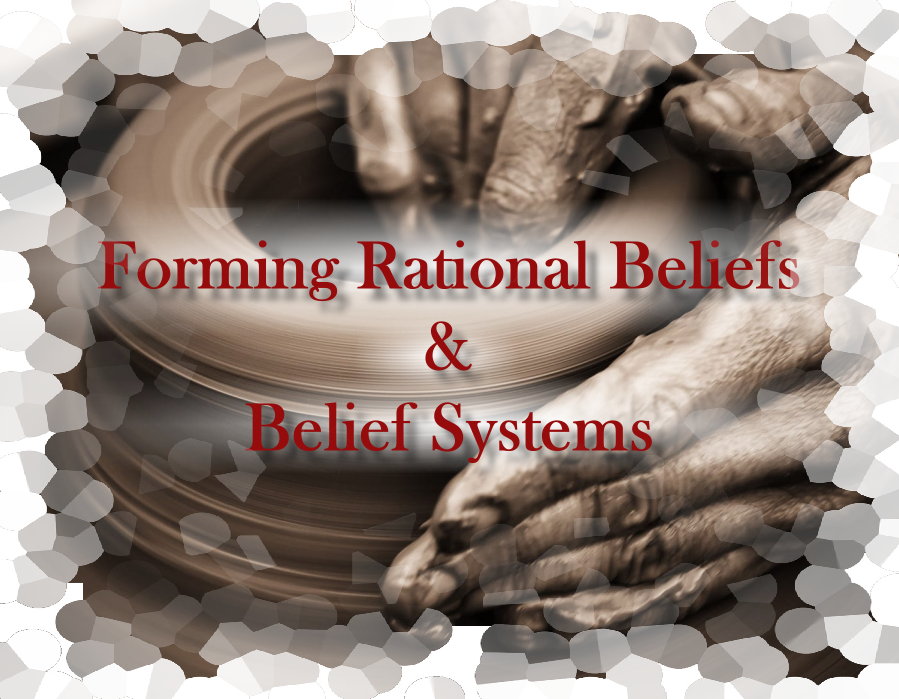
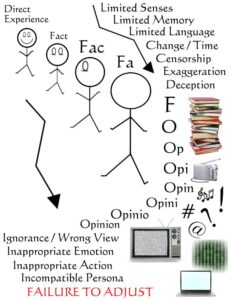
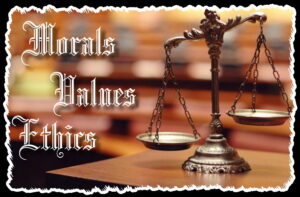
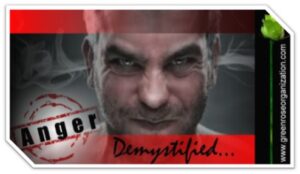
You’ve woven a tapestry of insight and grace; each sentence is a thread of beauty and meaning.